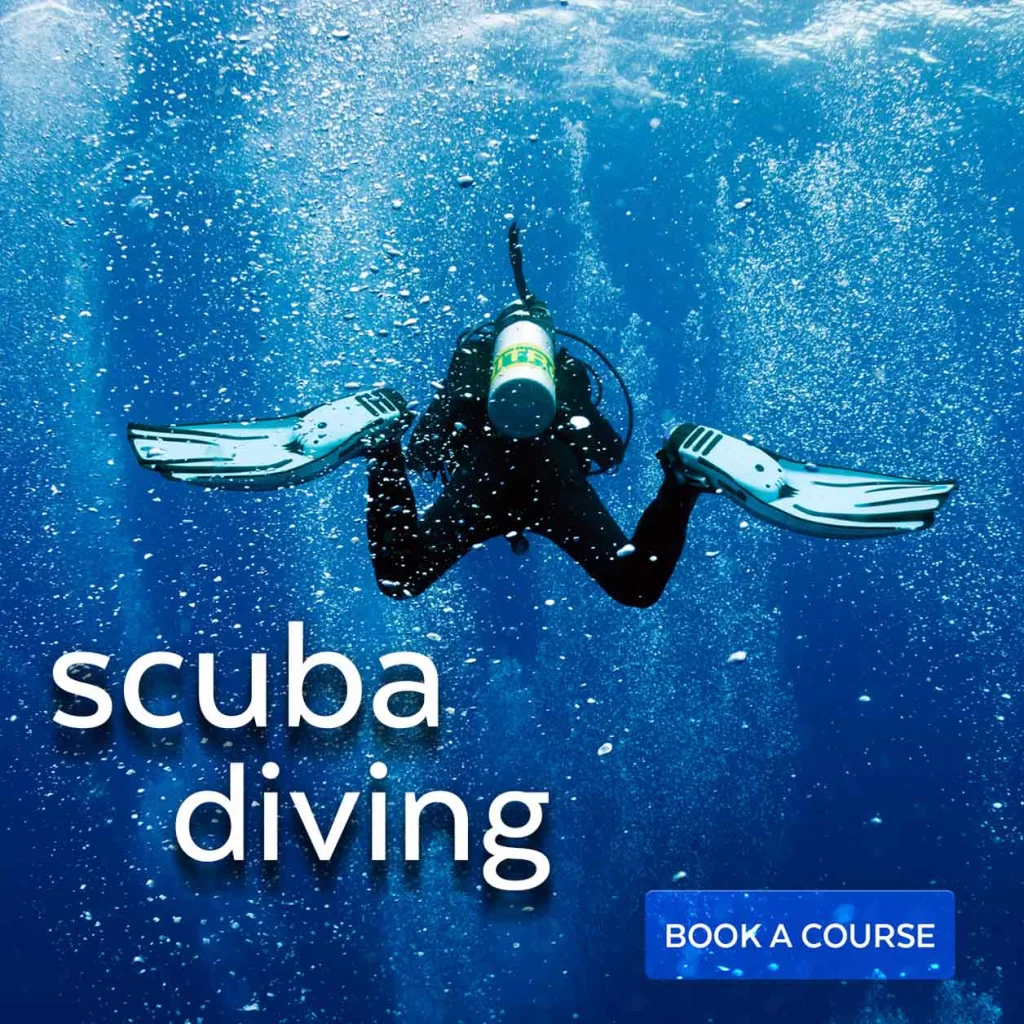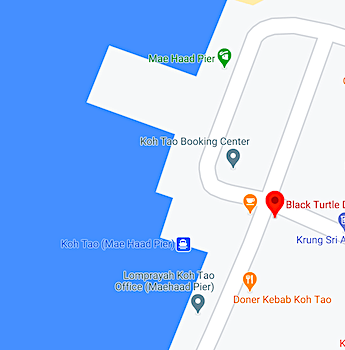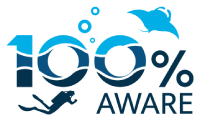Coral Restoration Course on Koh Tao, Thailand
Learn Coral Restoration Theory & Techniques in Thailand

Coral Restoration: The Key To Saving Our Oceans
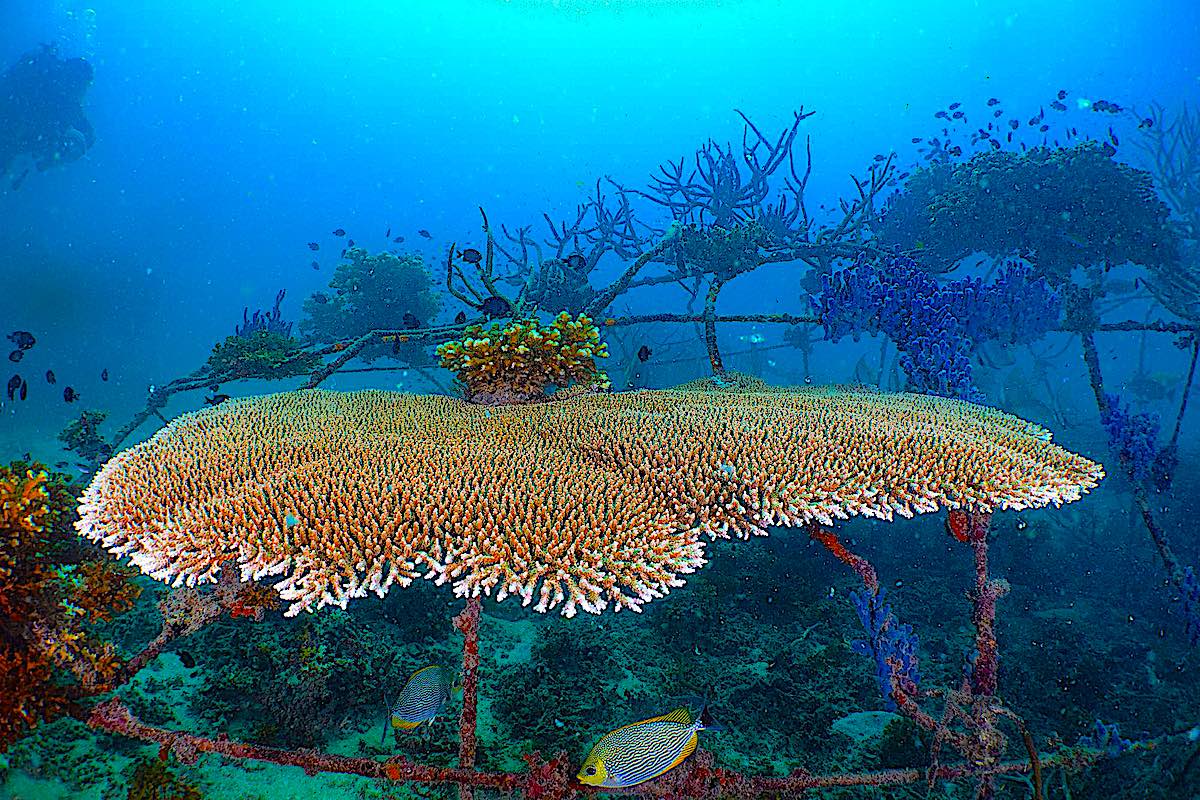
Why Coral Restoration is Important
Through education, coral restoration programs can help to preserve and protect coral reefs and ensure that they continue to provide many important benefits:
Increased Biodiversity – Coral reefs are home to a wide variety of marine life, and coral restoration can help to increase the biodiversity of these marine ecosystems, which can lead to increased opportunities for scuba divers to see and photograph a wide variety of marine animals.
Improved Water Quality – Coral reefs help to filter the water in the ocean, and coral restoration can help to improve water quality, which can make the ocean a more enjoyable environment for scuba divers to dive in.
Sustainable Tourism – Coral reefs are a major source of tourism revenue for many countries, and coral restoration can help to ensure that this tourism industry remains sustainable. This can benefit scuba divers by providing them with more opportunities to dive in beautiful coral reefs.
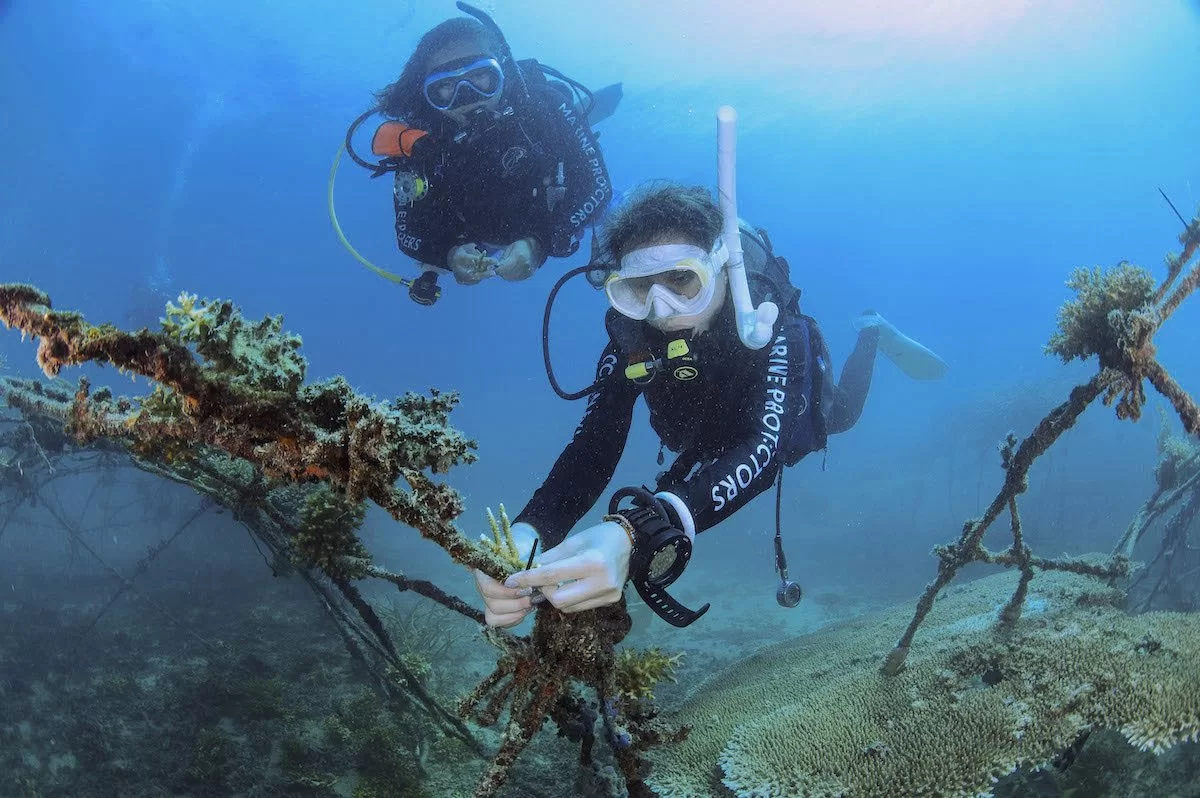
What we can do to help protect Coral Reefs
Learn more about Coral Restoration and help save coral reefs around the world.
The scientific community have known that coral reefs have been in peril for many years. A study published in 2021 by the One Earth journal, assessing coral losses around the world in detail, really highlights the severity of the situation. This in-depth study concluded that global coverage of living coral has significantly declined by 50% since the 1950’s.
Furthermore, Coral Reef associated fishing peaked in 2002 and is now in decline despite increased fishing. Catch per unit measurements have decreased by over 60% since 1950. Scientists estimate that at least 63% of coral reef associated biodiversity has declined in this time period.
Scientists have found that a variety of factors such as pollution, overfishing, habitat destruction, coral bleaching and climate change are decimating coral reefs, destroying these fragile ecosystems and jeopardizing entire communities who depend on coral reefs for their livelihoods.
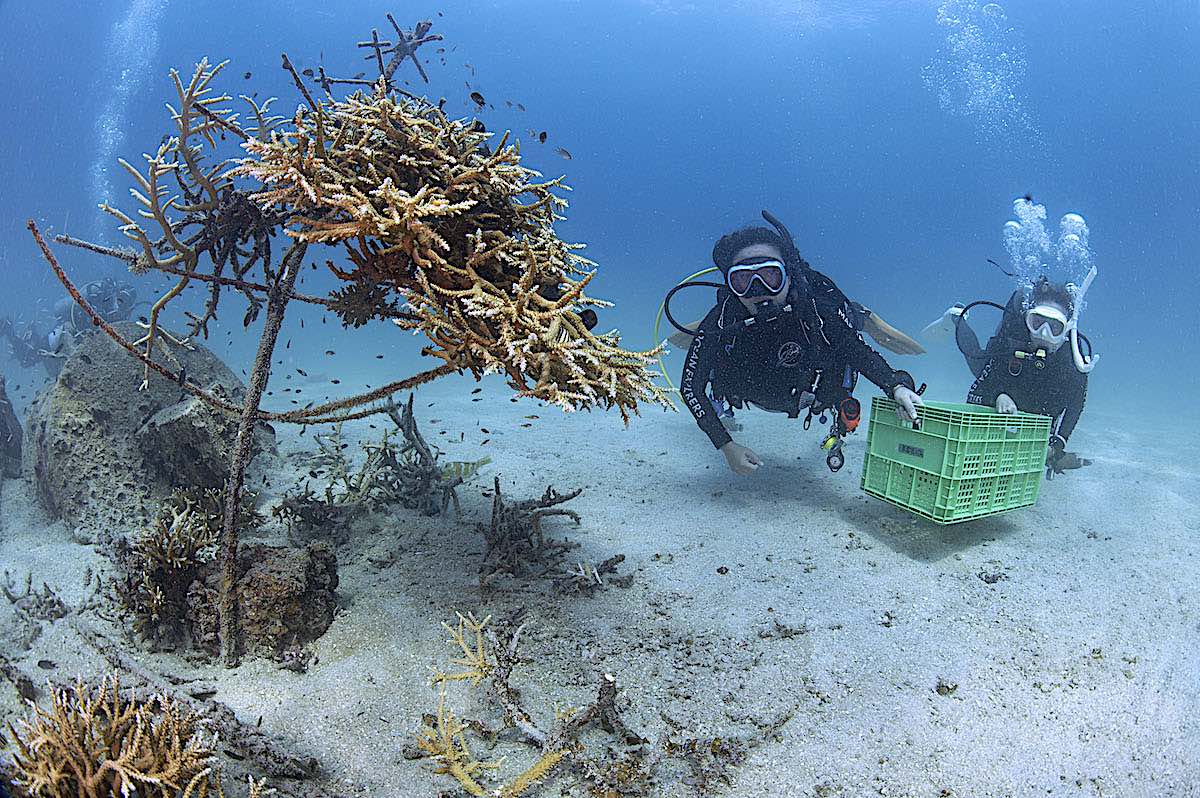
Coral Propagation on Koh Tao in Thailand
Coral restoration is a critical approach to help mitigate the impacts of these threats and restore degraded coral reefs. Coral Restoration involves the cultivation and transplantation of coral fragments onto degraded reefs to help them recover and grow.
- Restoring and enhancing the ecological function of the reef, providing habitat for marine life, and supporting food security and livelihoods for local communities.
- Improving the resilience of corals reefs to future threat such as climate change and ocean acidification
- Increasing the economic value of coral reefs for tourism, recreation and other industries
Our established conservation partners Eco Koh Tao, started their first coral nursery in 2008 at Junkyard Reef and their coral reef restoration program has evolved significantly since then.
We take a holistic approach to coral restoration, which allows us to focus on the long-term sustainability of the marine ecosystem.
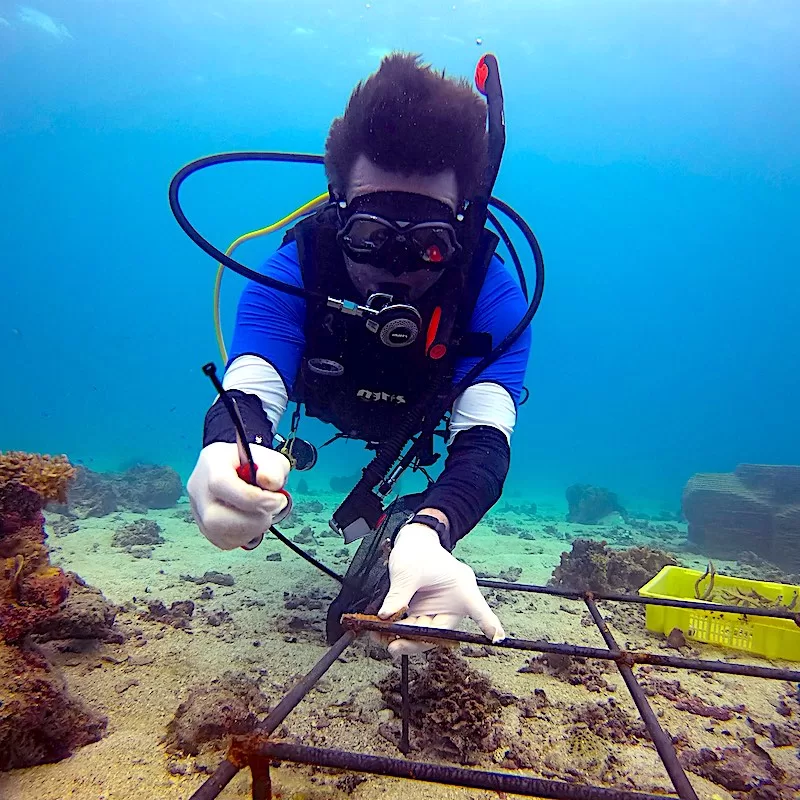
Coral Restoration Theory & Techniques
We use a variety of coral restoration techniques. Corals are collected as fragments or corals of opportunity and attached to table nurseries or mid water ropes for a few months then re-located onto the natural reef or artificial reef structures.
These artificial structures vary from steel tables and frames, glass bottles embedded in concrete and concrete reef balls and many other forms. We use a variety of attachment methods including cable ties, nylon thread, fine metal wire or epoxy cement.
As part of our partnership with Eco Koh Tao, we have two active coral restoration sites at Junkyard Reef and Black Turtle Reef and we have legal proposals for both of these sites and work in conjunction with the Department for Marine & Coastal Resources (DMCR).
Junkyard Reef Coral Nurseries
Junkyard reef was a new artificial site and the plan has always been to alleviate pressure from existing natural dive sites by offering an alternative to dive centers wishing to conduct shallow training dives (7m-12m depth).
Our latest coral restoration project is Black Turtle Reef. The project objective is to restore areas of the fringing reef on the west side of Koh Tao, which have been damaged due to anchors and other environmental factors such as storm damage, sedimentation and pollution.
Both these sites have transplanted corals attached to a variety of artificial reef structures, and directly onto the reef using the coral gardening technique.
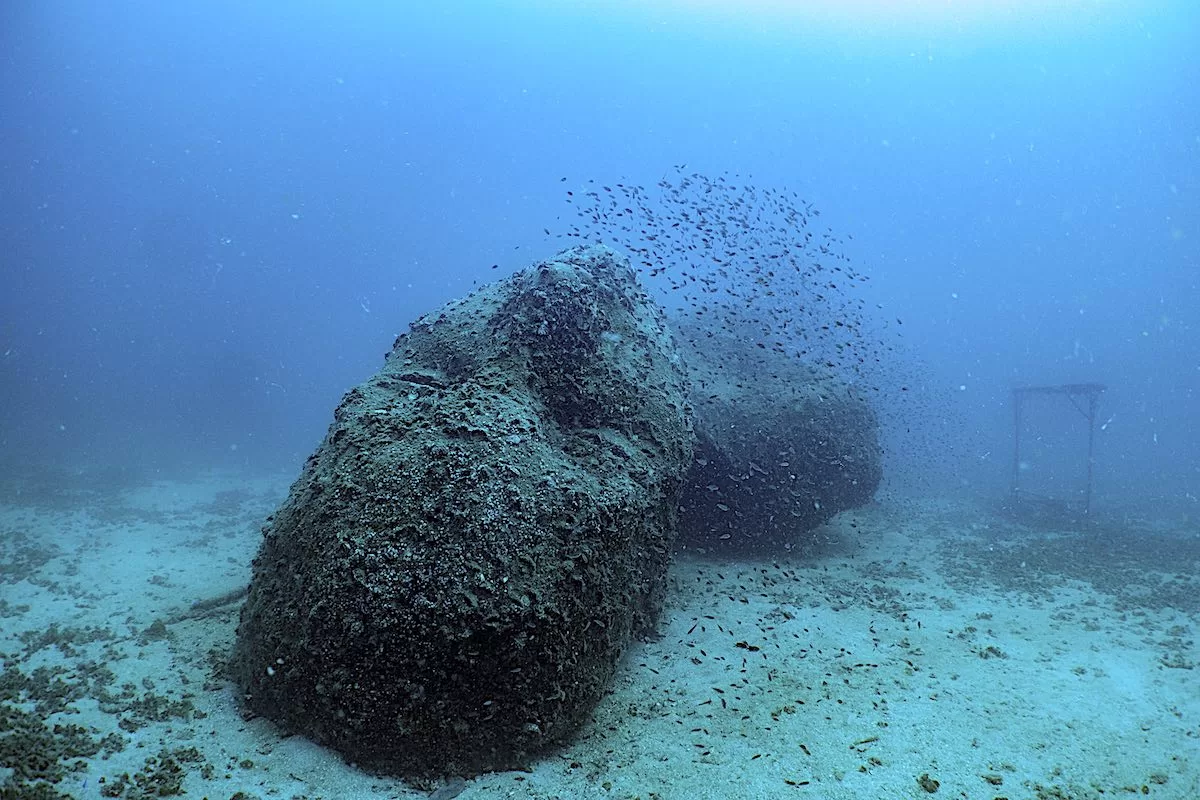
Coral Restoration – Improve Scientific Knowledge & Understanding
The Conservation Diver Coral Restoration Theory & Techniques course is a great introduction to Coral Propagation & Restoration and scuba divers taking this course will study a range of topics including:
- Coral Gardening
- Coral Fragment Collections
- Coral Nursery maintenance and monitoring
- Out-planting corals to the reef
- Monitoring transplanted corals
- Integration of beneficial organisms
- How to take a genetic-based approach to reef restoration
To enrol on our Coral Restoration Theory & Techniques course an individual must first have completed the Ecological Monitoring Program course.
The Ecological Monitoring Program is at the center of the Conservation Diver training, education and research program, and as such, this course is a prerequisite for many of the other courses offered by Conservation Diver. The EMP course provides divers with hands on experience that can be applied to future academic or professional pursuits.
Completing this course is a rewarding and enriching experience for everyone, regardless of whether you are pursuing a career in this field or simply have a personal interest in marine life and the oceans. Those who master the skills & knowledge on the EMP course are encouraged to then go on to achieve the Advanced Ecological Program certification.
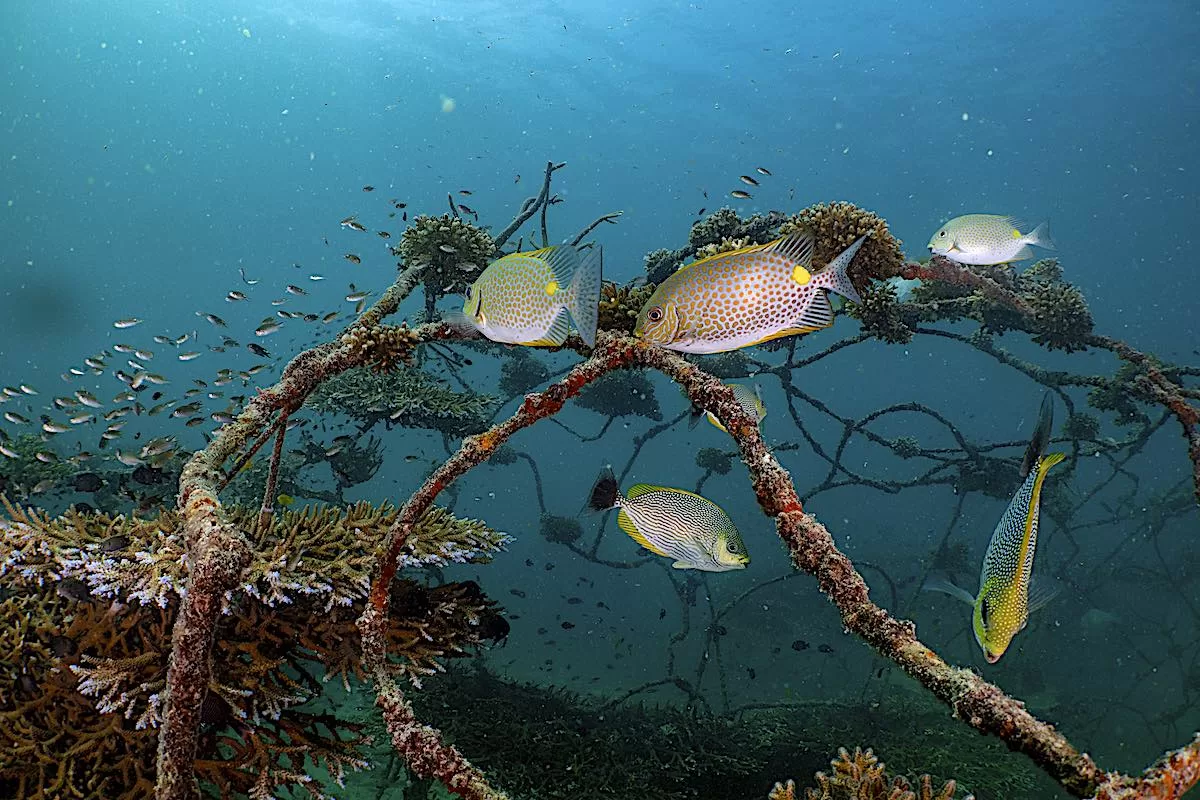
Coral Restoration – Become a Coral Reef Researcher
The Advanced Ecological Monitoring Program certification is awarded to students who show exceptional research skills.
An individual must already be an EMP diver and have completed Conservation Diver Specialty training courses in Coral Taxonomy & Identification, Coral Disease & Compromised Health and 3 other monitoring courses.
The Coral Restoration Theory & Techniques course can credit towards one of these 3 Specialty training courses, which credits towards Advanced Ecological Monitoring Program certification.
Coral reef researchers and students all round the world use similar programs to collect data, which means the Advanced Ecological Monitoring Program will help with your professional efforts too.
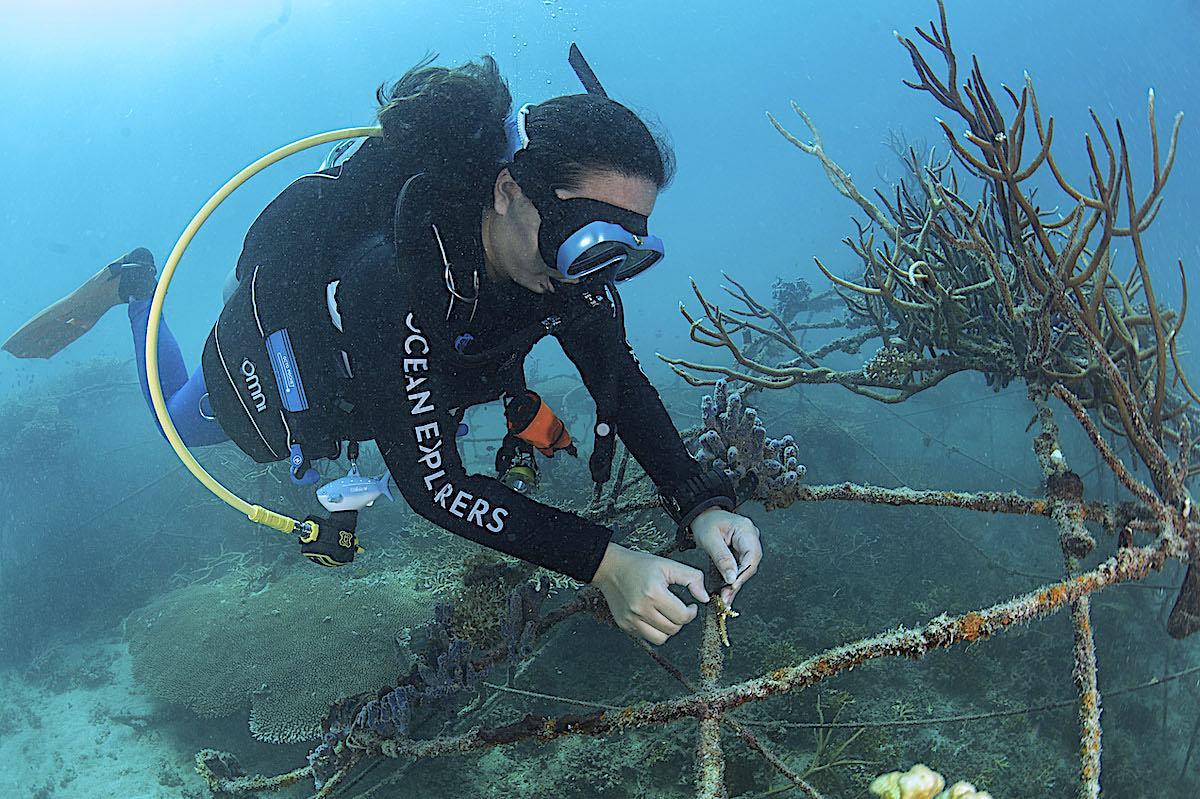
Successful Coral Restoration Projects in Koh Tao, Thailand
By increasing awareness and through participation, we can decrease our impacts on coral reefs and provide solutions to protecting and restoring the reefs around the globe and help to make a difference.
Most successful restoration projects have been achieved by small groups and local communities, rather than governments or policy makers and Black Turtle Dive is continuing this tradition, doing as much as we can to protect the local environment on Koh Tao.
After completing this course, students will know how to perform the reef research methods of the Ecological Monitoring Program and can continue to help with data collection.
You will gain knowledge about coral reefs and their inhabitants. Students will learn how to identify indicator fish, invertebrate species and substrate types, and gain experience working with equipment underwater. You will also practice buoyancy and navigation skills.
Once you have successfully completed the training you can assist on our monthly EMP’s, and participate in EMP’s in other areas of the world through our network of Conservation Diver Centers.
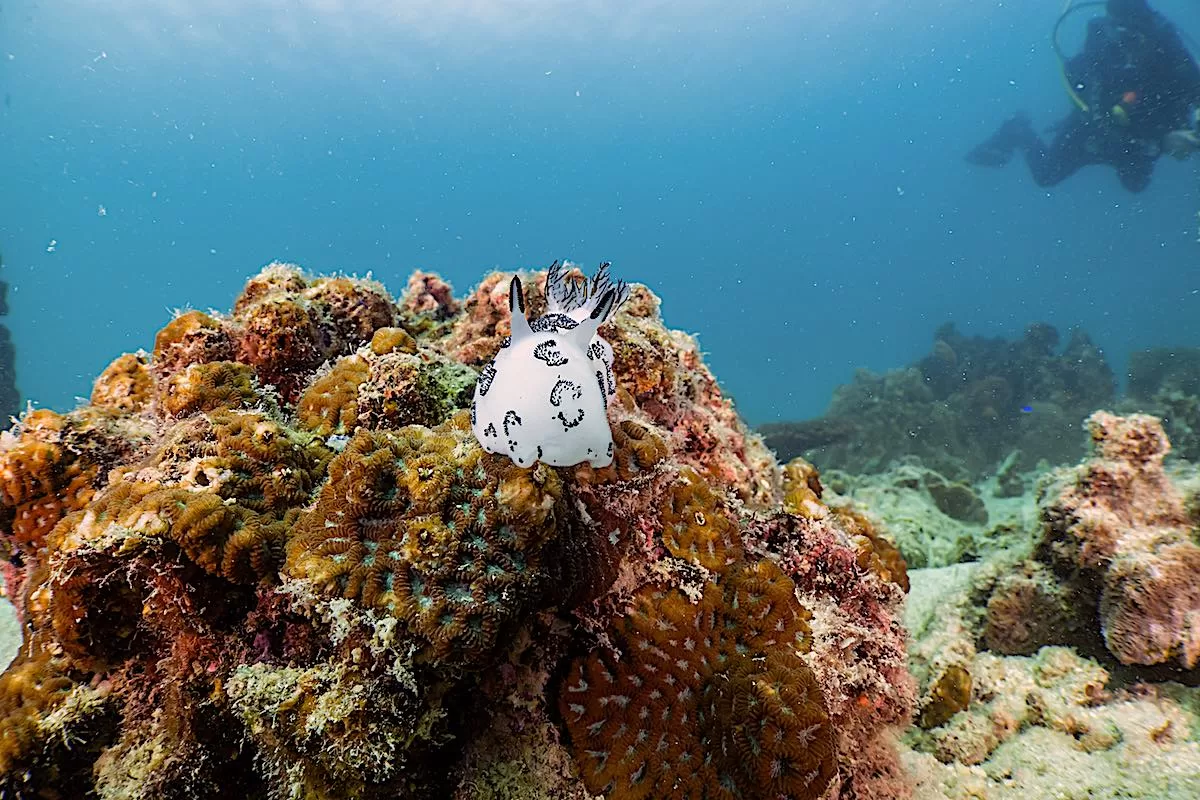
Coral Restoration Course Outline
- 1 day program
- 2 training dives
- Coral Restoration Theory & Techniques course e-learning manual
- Rental of all scuba equipment
- FREE use of Dive Computer
- Log book.
- Black Turtle Dive Customer (and environmental) promise and pledge
Coral Restoration Theory & Techniques Prerequisites
- Be 12 years of age or older
- Be a competent swimmer if performing the course snorkeling
- Be certified as an Advanced diver under a leading diving organization (PADI, SSI, RAID, etc.)
- Have completed the Ecological Monitoring Program course and be certified as a Conservation Diver EMP Diver.
All Conservation Diver Coral Restoration Theory & Techniques course divers must demonstrate proper diving ability at an advanced level and be proficient in buoyancy and self-awareness beyond Open Water course training.
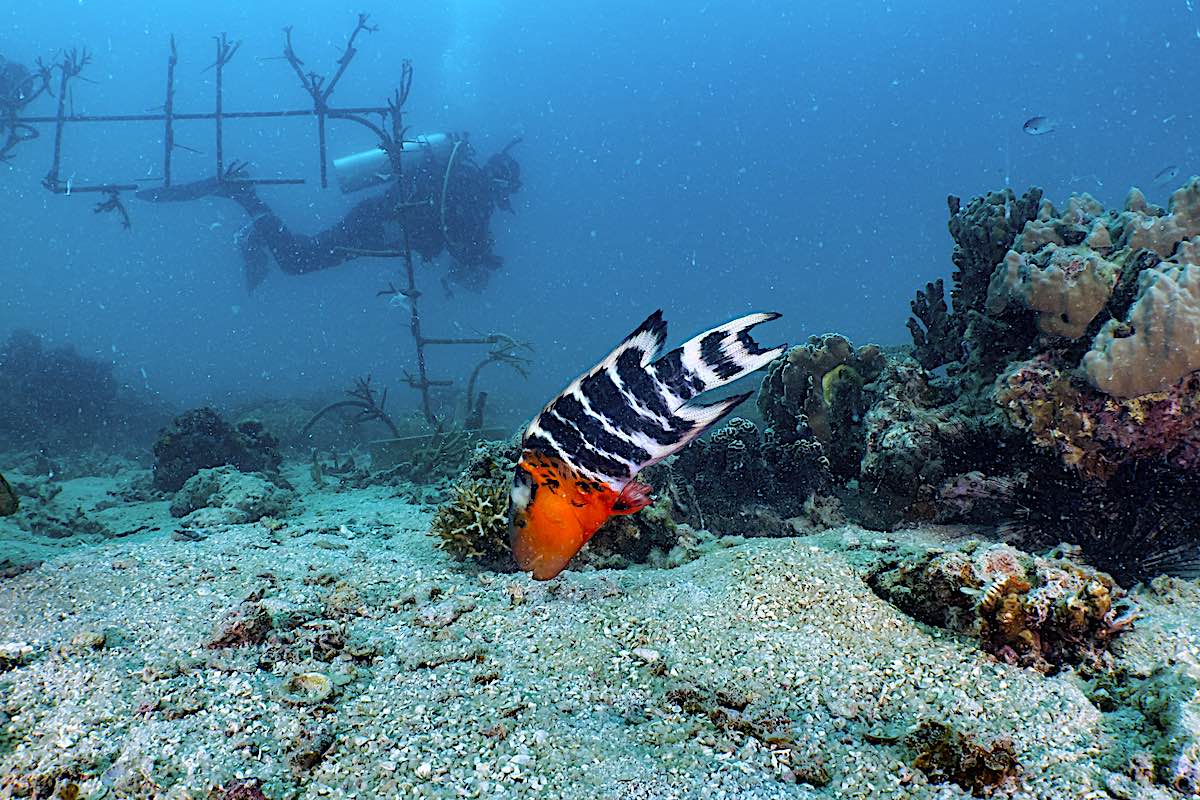
Coral Restoration Course Requirements
- Attend the Instructor led presentation on Coral Nursery Theory and Techniques
- Complete the Coral Restoration Theory & Techniques e-learning course
- Complete the Coral Nursery Theory & Techniques exam and score at least 80%
- Attend the practical briefings prior to the Coral Restoration Theory & Techniques training dives
- Perform 2 Open Water training dives covering the following:
Coral Nurseries
- Collect coral fragments and secure to the nursery
- Perform maintenance and cleaning
- Collect data on growth rates, mortality, and diversity
Coral Gardening Theory & Techniques
- Re-secure at-risk coral fragments, by either wedging or using epoxy or securing to benthic grids
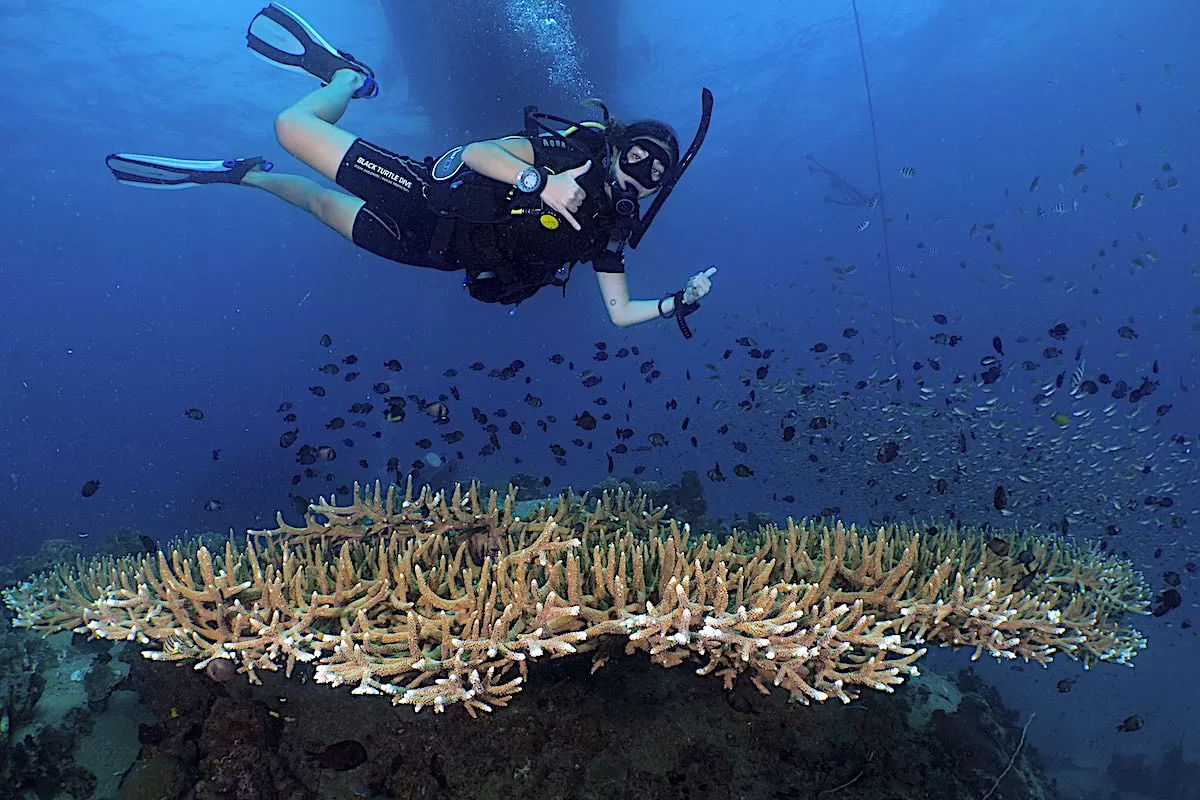
Coral Restoration Course Resources
- Understand the threats to coral reefs, the factors affecting coral growth, and the basics of coral reef restoration
- Understand coral life cycles, the ecological differences between the asexual and sexual reproductive cycles in corals, and the importance of maintaining high biodiversity on the reef
- Understand the history and evolution of coral restoration techniques and local standards (do’s and dont’s)
- Understand the theory behind the use of coral nurseries and the practical application of locally and internationally developed techniques
- Perform the practical steps of building and maintaining a coral nursery
- Perform a monitoring dive to take data on the health, growth, and diversity of a coral nursery
Knowledge Development
The knowledge development section of the Coral Restoration Theory & Techniques course is divided between independent study (E-learning) and a classroom knowledge development presentation, pre-dive briefings, and post dive debriefings led by one of our Conservation Diver Instructors.
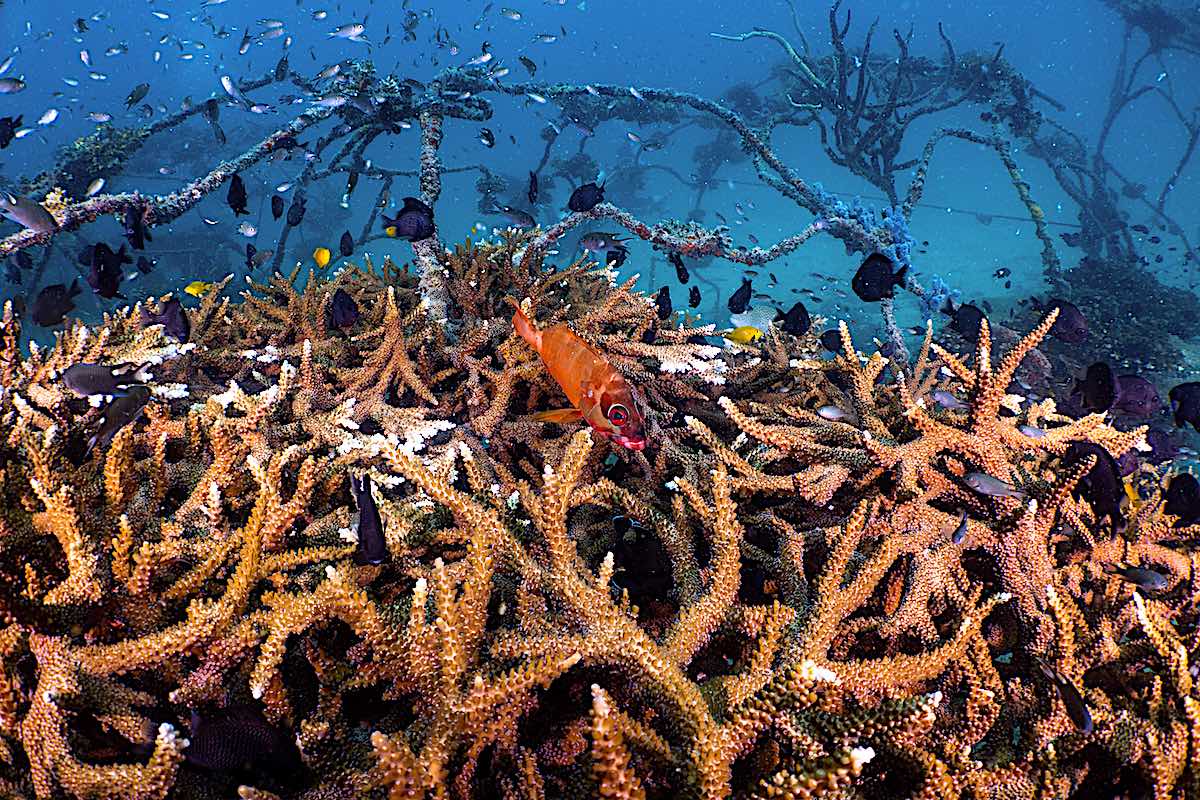
The e-learning section covers six sections and the following subjects:
Coral Restoration Course Standards & Requirements
- Prerequisites
- Standards
- Requirements
Introduction to Coral Restoration
- The Local Reef Manager
- Knowing what your local reefs needs are
- Climate Change & the status of the world’s reefs
Brief history of Coral Reef Management and Protection
- Passive Restoration & Marine Protected areas
- Active restoration to improve coral abundance and health
Methods of Coral Restoration in Thailand
- Types of coral restoration
- Structural restoration
- Biological restoration
- Physical restoration
- Putting it all together
3 Step Coral Restoration System
- Step 1: Collecting a feedstock of corals
- Step 2: Rearing mature coral colonies
- Step 3: Transplanting to natural or artificial structures
- Effectiveness of the 3-step technique
- Taking a Genetic approach
Monitoring & Maintenance of Coral Restoration Projects
- Monitoring the Reef
- Monitoring & Maintenance of corals and nurseries
- Monitoring & Maintaining corals post-transplantation
We recommend that you complete all independent eLearning before you start the Coral Restoration Theory & Techniques course.
However, if you are signing up late, or have been unable to complete the e-learning prior to arrival, we will ensure you complete prerequisite study in a manner that supports the in-water skills.
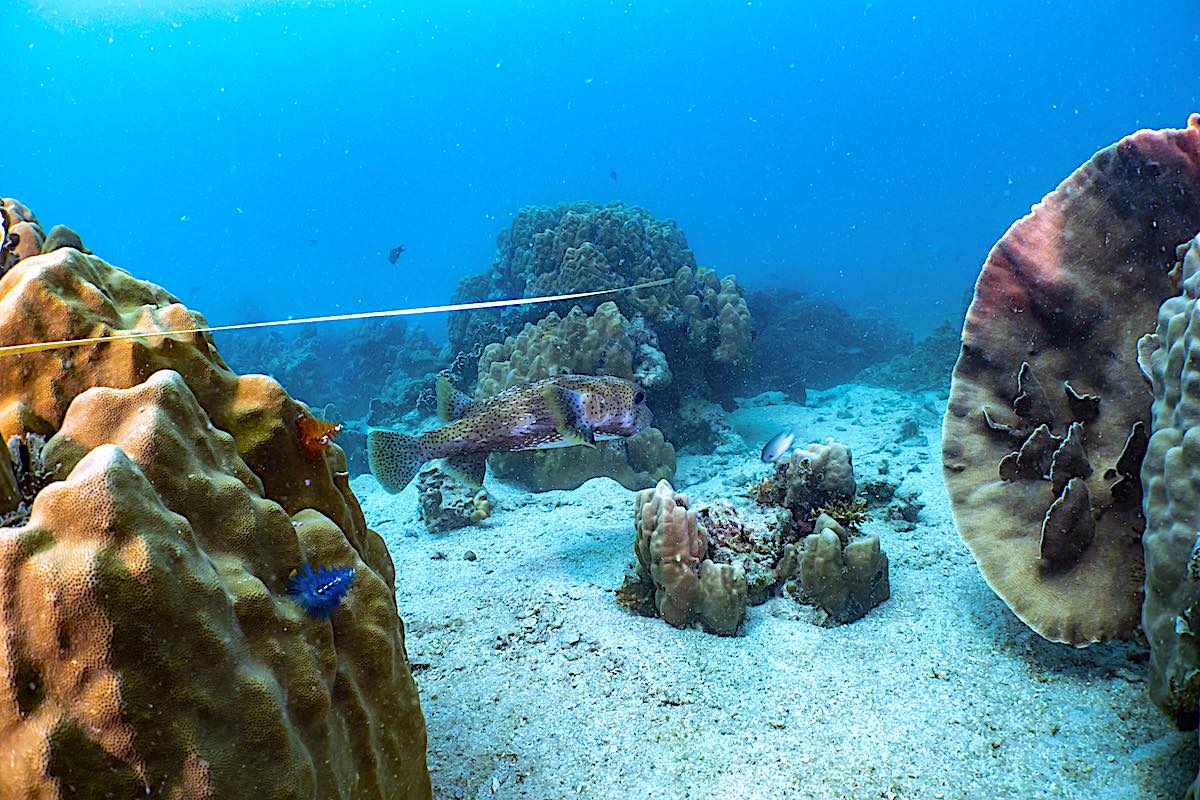
Coral Restoration Theory & Techniques – Topics Covered
- Why we need coral restoration
- The loss of corals in the last three decades
- Stress on Coral
- Natural disturbances
- Human disturbances
- Water Pollution
- Macro Algae Blooms
- Red Tides
- Coral Disease
- Erosion & Sedimentation
- Anthropogenic effects on the marine environment
- Physical disturbances – Anchors
- Irresponsible Fishing practices
- Ocean Acidification
- Reef Restoration & Management
- Goals of Restoration
- When to do active coral restoration
- Recruitment success
- Socio-ecological effectiveness
- Restoration Process
- Hard Corals & Reproduction
- The 3 Step Restoration process
- Step 1 Collect a feedstock of corals
- What is and what is not a coral fragment
- Storing fragments
- Main stream coral propagation procedures
- Genetics Guide to Coral Restoration
- Micro-fragmentation techniques
- Where to collect fragments
- Step 2 Rear corals on nurseries
- Choosing a coral nurseries site
- Why Coral nurseries
- How coral nurseries are used
- Starting nurseries
- Shaping & sizing fragments
- Attaching fragments to nurseries
- Growth period
- Step 3 Transplanting
- Restoration equipment
- Coral Transplanting techniques
- Review artificial reef structures
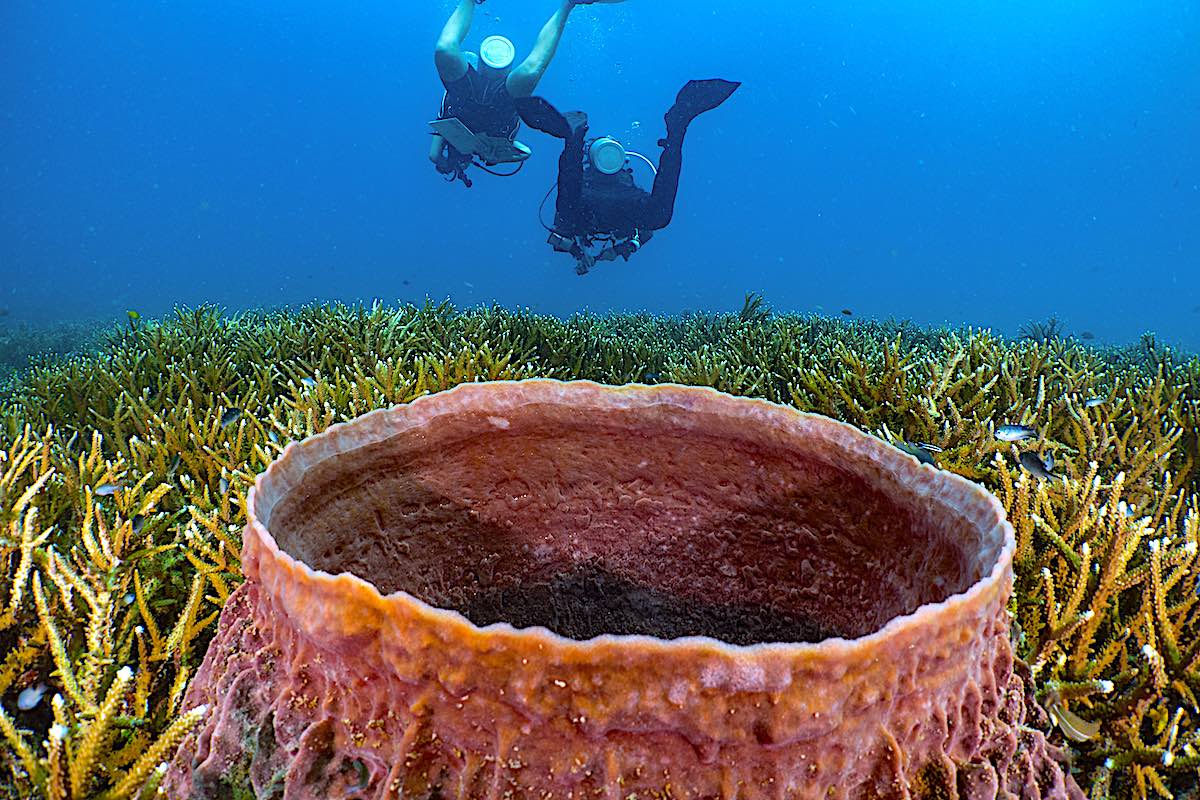
Water Skills Development & In-water Workshops
- Buoyancy assessment
- Perform 2 practical dives – either/or
Coral Nurseries
- Collect coral fragments and secure to the nursery
- Perform maintenance and cleaning
- Collect data on growth rates, mortality, and diversity
Coral Gardening Techniques
- Re-secure at-risk coral fragments, by either wedging or using epoxy or securing to benthic grids
To successfully complete the Coral Restoration Theory & Techniques course you must:
- Complete Coral Restoration Theory & Techniques e-Learning modules
- Attend the Instructor led Coral Nursery Theory & Techniques knowledge development presentation
- Complete the Coral Nursery Theory & Techniques exam and score at least 80%
- Complete the 2 training dives covering coral transplanting techniques, maintenance & monitoring of nurseries and corals post transplantation and coral gardening
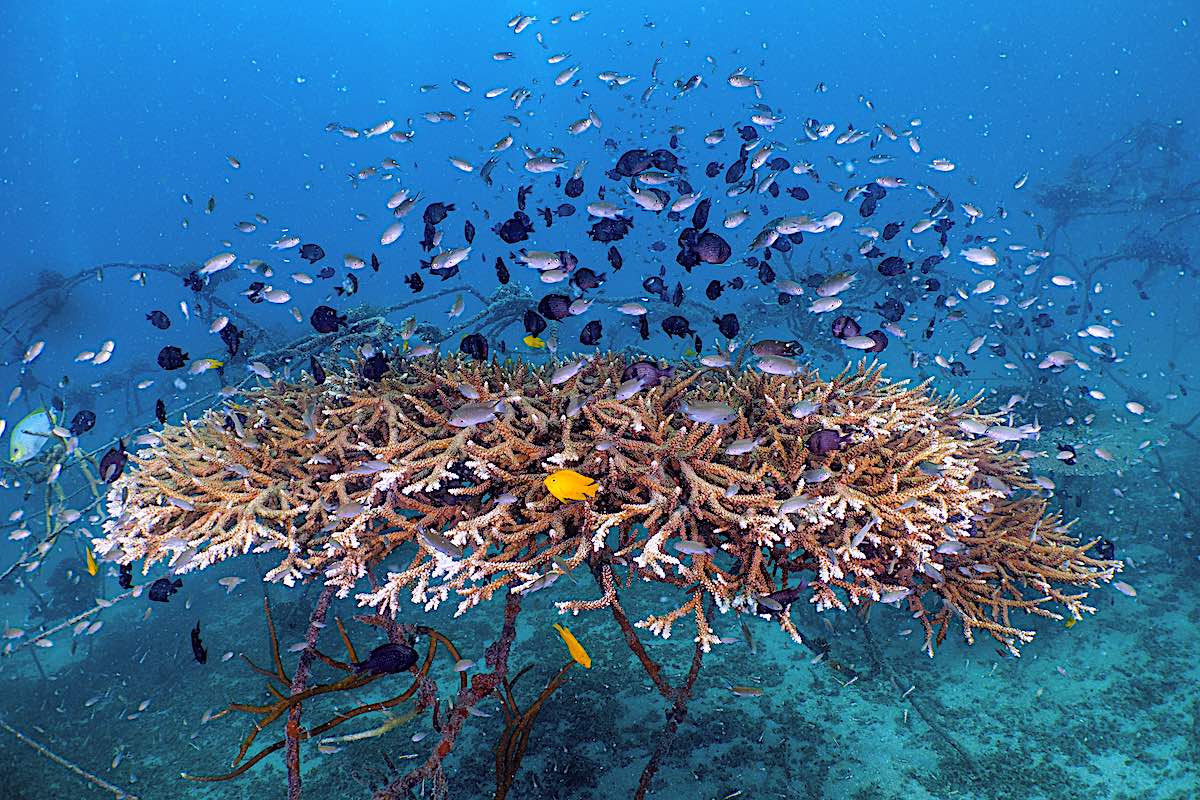
Coral Restoration Theory & Techniques Course Cost
BOOK NOW 6,000 THB
At Black Turtle Dive we take our customer promise very seriously and wish to provide you with the highest quality training and customer service.
The marine conservation program at Black Turtle Dive was launched in 2022, having evolved out of Eco Koh Tao, one of the longest running environmental organisations on the island.
Eco Koh Tao was founded by Nathan Cook, a master of Marine Science from Southern Cross University, Australia and Matt Bolton, a PADI Course Director who first brought Reef Check to the island in 2007 and founded Black Turtle Dive.
Eco Koh Tao planned and developed Junkyard Reef, Koh Tao’s first and arguably most successful artificial dive sites. This work started in 2006 and continues to this day and Junkyard Reef hosts thousands of Open Water training dives every year, taking pressure off existing natural dive sites around Koh Tao.
Eco Koh Tao has also worked hard over the years monitoring reef health and being involved in multiple restoration projects. This work included being an integral part of the Save Koh Tao organization that spearheaded Buoyancy World, an island wide initiative to develop a second artificial reef dive site in 2009.
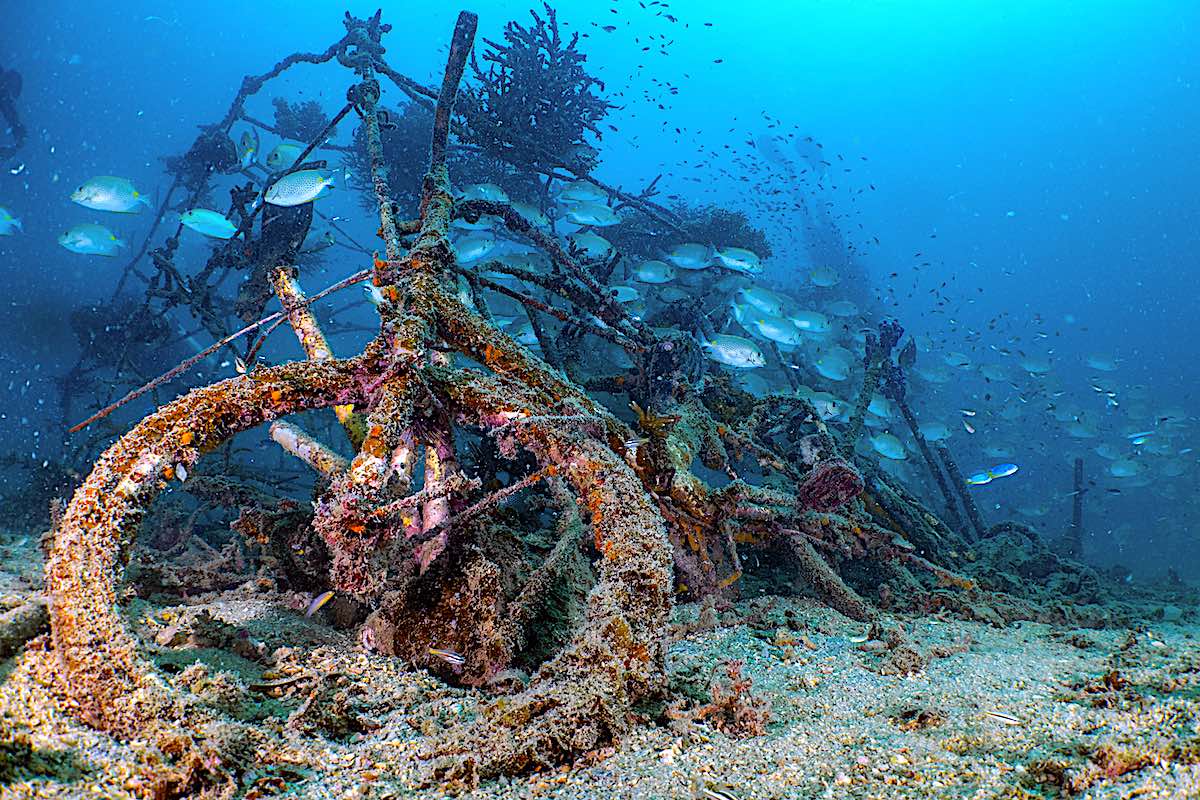
Eco Koh Tao – Marine Conservation on Koh Tao
Black Turtle Conservation symbolises the unification of Koh Tao’s two original ocean researchers, Nathan and Chad Scott. Chad founded Conservation Diver on Koh Tao in 2014, following 6 years of development work at his NHRCP program.
Conservation Diver is now a world leader in marine conservation education and has certified thousands of ocean enthusiasts over the past decade.
Eco Koh Tao and NHRCP worked towards mutual goals for many years, but it is with our Black Turtle Dive program, their deep local knowledge and global conservation vision, combines to form what we believe is the best-in-class Reef Ecology And Conservation Training program (REACT).
Conservation Diver Network
The Conservation Diver global network extends across 11 locations, with 50+ instructors, teaching over 35 different marine science courses, bound together in the mission to train the next generation of marine conservationists.
Black Turtle Conservation are proud to be part of this shared vision. By working together in this way, we are able to benefit from data collaboration and the vast knowledge shared between a large group of experts in varying fields.
No other network in the world exists that connects conservation programs in such a way, which gives our students the benefit of being part of a movement of research and conservation much larger than one single program of work.
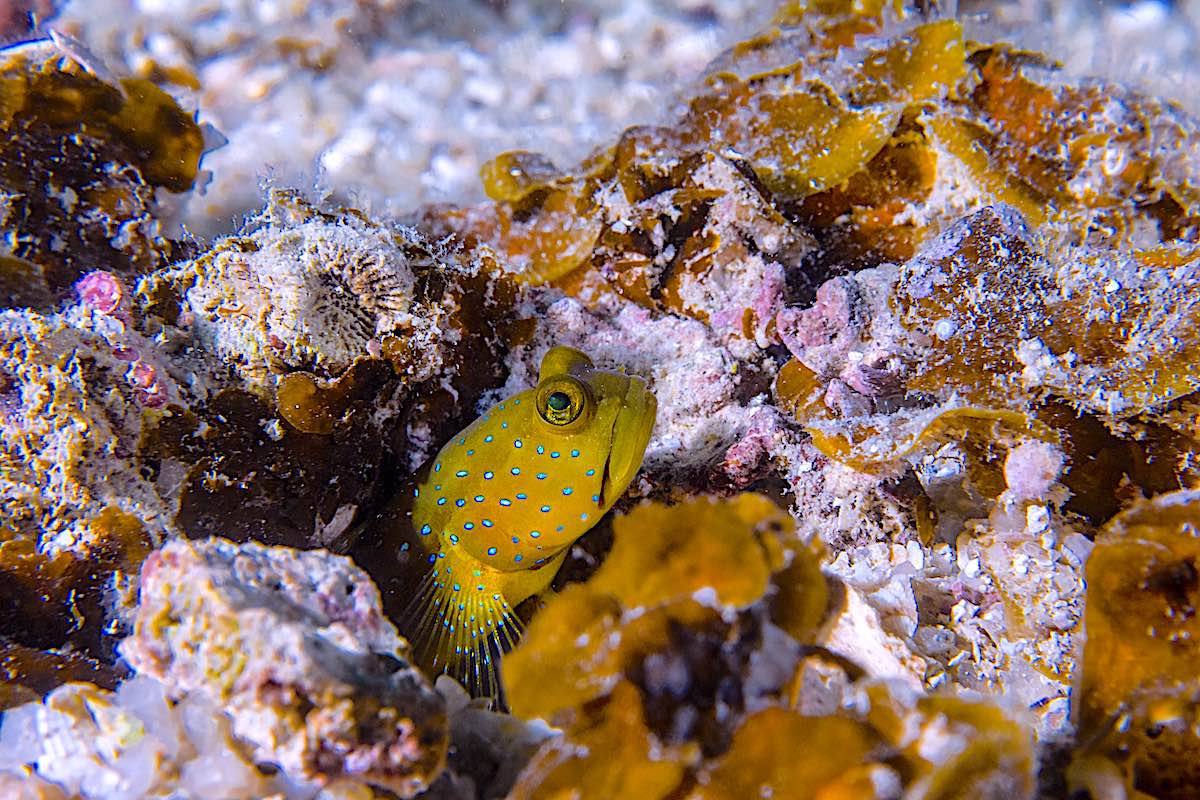
Coral Restoration Course Schedule
Coral Restoration Theory & Techniques course is scheduled over 1 day.
Day 1
- Orientation
- Coral Restoration Theory & Techniques knowledge development presentation
- Complete the Coral Nursery Theory & Techniques exam
- LUNCH
- Attend the practical briefings prior to the Coral Restoration Theory & Techniques training dives
- Buoyancy Assessment
- Dive 1: Coral transplanting techniques, maintenance & monitoring of nurseries
- Dive 2: Maintenance & monitoring of corals post transplantation and coral gardening
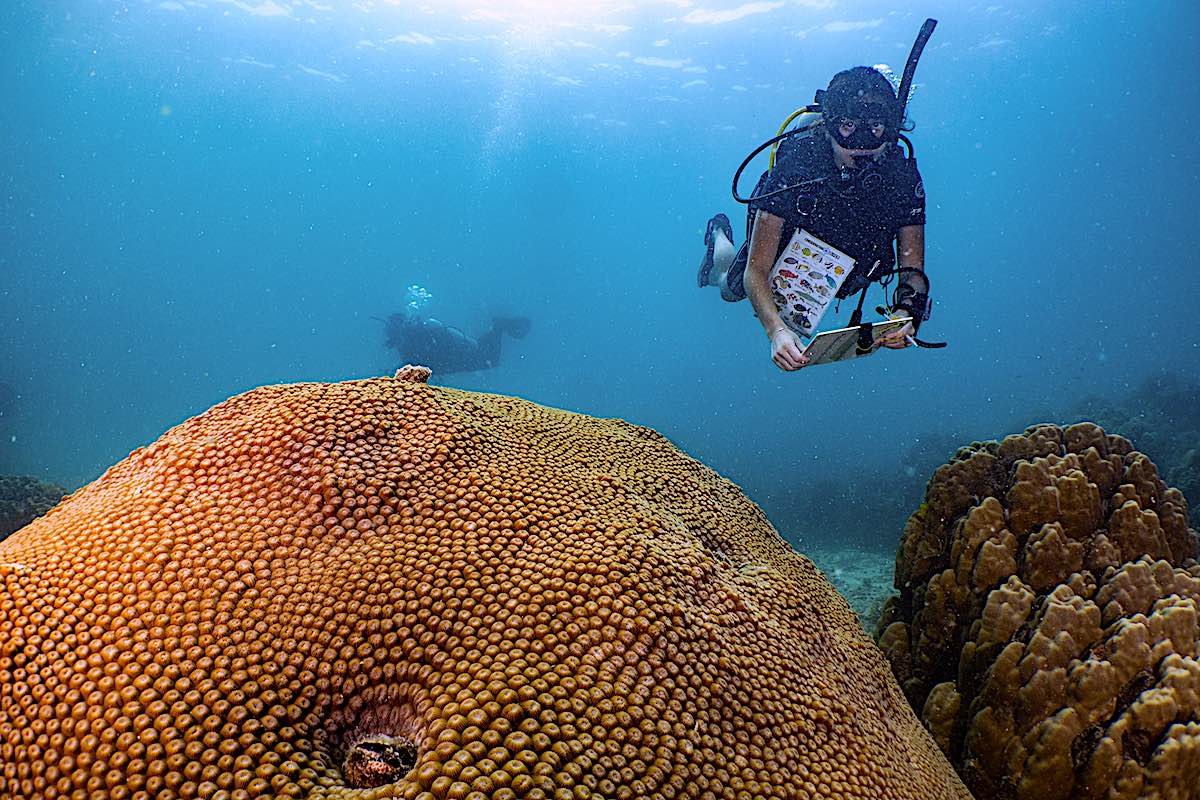
Coral Restoration Course Information
Coral Nursery Theory & Techniques – Orientation & Knowledge Development. As soon as you sign up, we will send your Coral Restoration Theory & Techniques course e-learning manual.
Once you have redeemed your access code you can start working your way through the e-learning and we recommend you complete the e-learning prior to the course.
You will start the Coral Restoration Theory & Techniques course with an Orientation.
This includes completing all required paperwork; Release of Liability/Assumption of Risk/ Non-agency Disclosure & Acknowledgment Form, Student survey, Student Responsibilities agreement, Scientific Diving Acknowledgment Agreement, Standard Safe Diving Practices Statement of Understanding and Medical Statement (RSTC Medical form).
Coral Nursery Theory & Techniques eLearning
As you can see from the schedule above the Coral Restoration Theory & Techniques e-learning knowledge development comprises of 6 modules. Each module has a corresponding e-learning section and ideally this will be completed before the instructor led presentation.
The instructor led knowledge development session is scheduled to precede ‘in water’ skill development and propagation and restoration dives, and will cover and elaborate on the 6 sections you completed during the e-learning. Additional dive and theory reviews and feedback are scheduled outside of the schedule, as and when required with each individual candidate.
You will be given a Coral Nursery Theory & Techniques exam after the classroom presentation, and prior to the restoration & coral gardening dives. Alternatively, you can complete the final exam prior to certification.
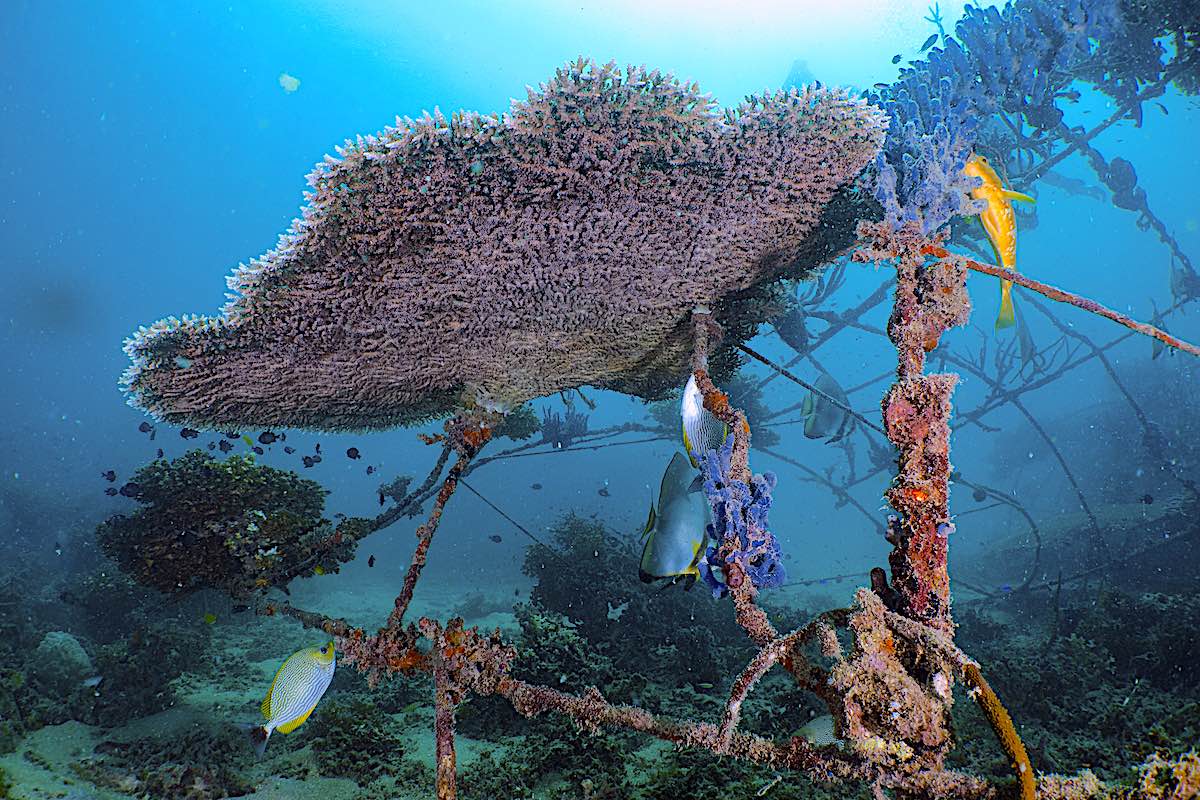
Water Skill Development workshops
Buoyancy Assessment for Scientific Diving – prior to all Conservation Diver training courses candidates must satisfactorily complete a buoyancy assessment with a Conservation Diver Instructor.
This includes being able to swim slowly with legs elevated to avoid damaging the reef with head in the down position.
You must be able to record data on an underwater slate whilst keeping an eye on the reef, maintaining buoyancy and NOT touching the reef with any part of your body or equipment.
You should also be able to maneuver easily in a manner that avoids any disturbance of the living reef.
Training Dive 1: Coral Nurseries Dive
- Collect corals of opportunity & secure onto the nursery using either the epoxy method or needle and thread, depending on the coral fragment genus.
- Perform maintenance and cleaning on the coral nursery
- Collect Data on growth rates, mortality rates and diversity
Training Dive 2: Coral Gardening
- Re-secure at-risk coral fragments using either wedging, epoxy or securing using needle and thread.
Best Coral Restoration Course in Thailand
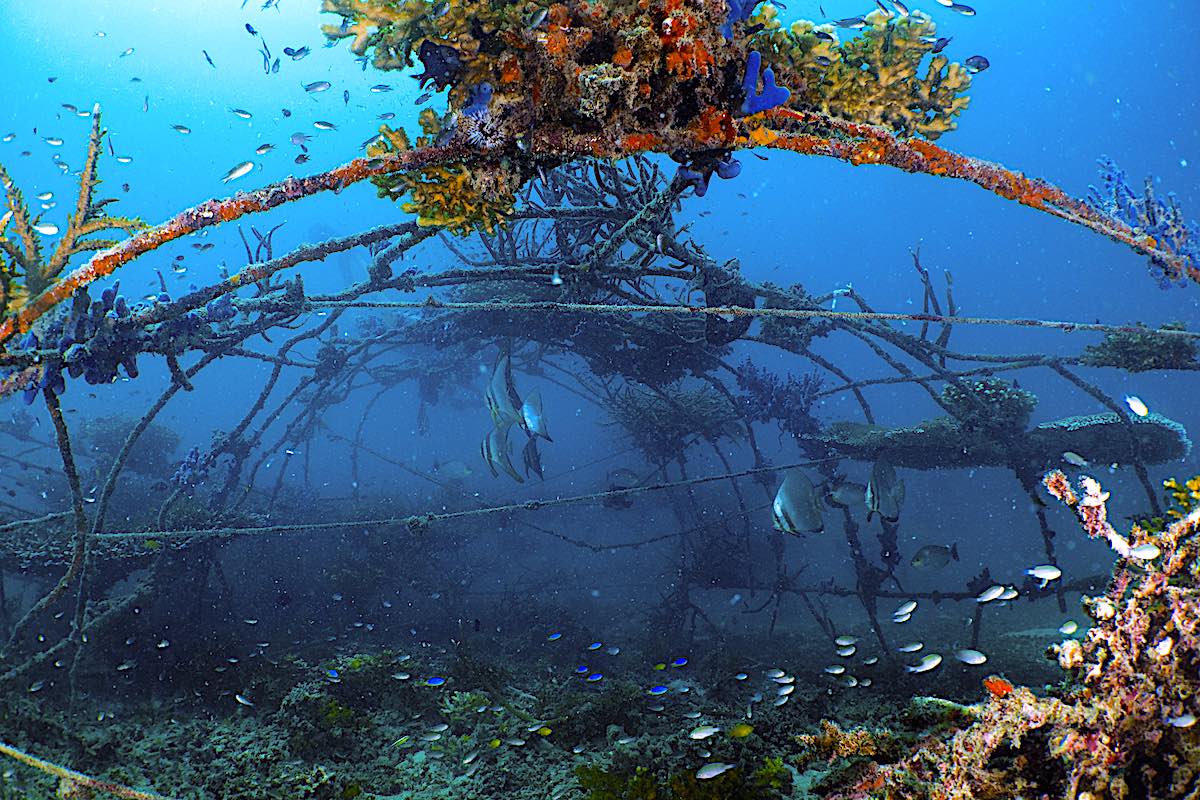
How Scuba Divers can help to Protect Coral Reefs
Dive responsibly. This means following all the rules and regulations that are in place to protect coral reefs, such as avoiding anchoring on reefs, not touching the coral, and using reef-safe sunscreen.
Educate others about the importance of coral reefs. Divers can share their love of coral reefs with others by talking about them, writing about them, and taking them diving.
Support businesses that are committed to protecting coral reefs. When you choose to spend money on diving equipment, dive tours, or other activities related to the ocean, choose businesses that are committed to protecting coral reefs.
Coral reefs are important ecosystems that provide food, shelter, and jobs for millions of people around the world and they are a very important contributor to tourism and recreation.
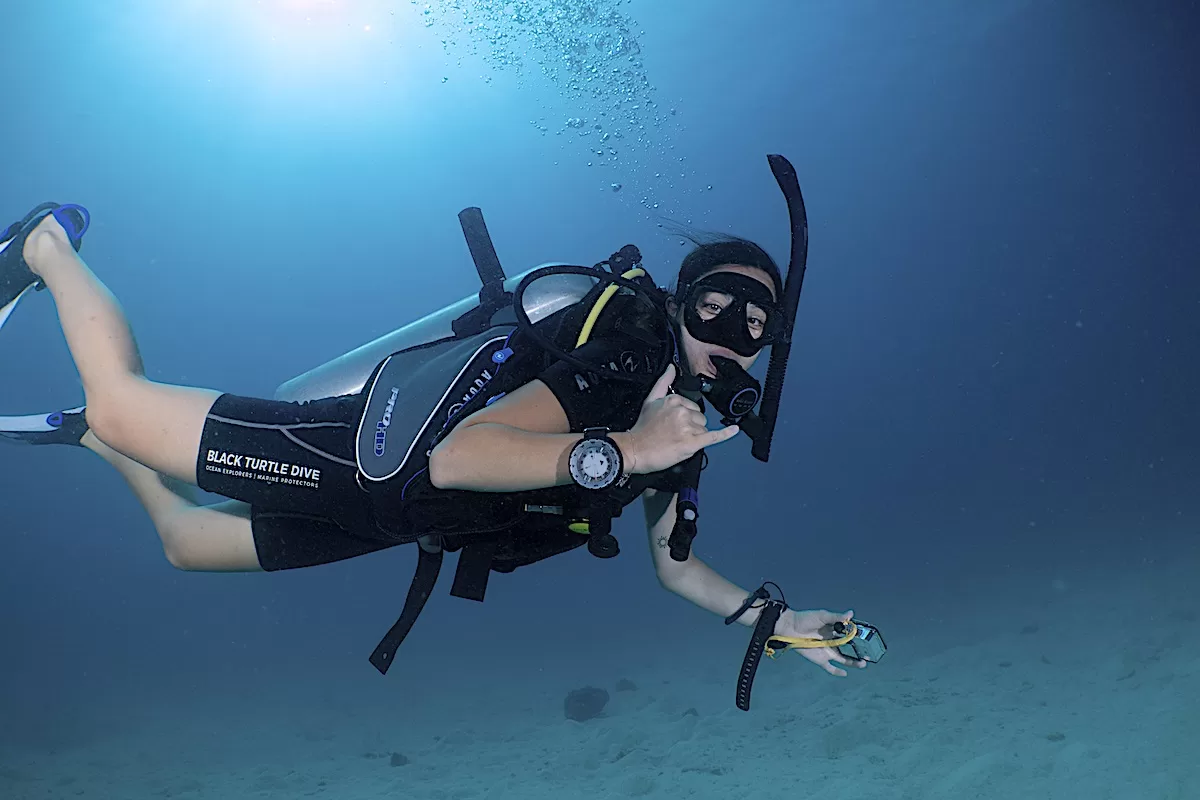
Support Businesses that protect Coral Reefs
Coral Restoration Internship: If you are serious about learning about coral restoration, you may want to consider taking one of our Marine Conservation Internships.
Our Marine Conservation Internships typically last from one week to several months, and they give you the opportunity to work with experienced coral reef biologists and coral reef restorationists.
By working together, scuba divers can help to protect coral reefs and ensure they continue to thrive for future generations. Contact us to fund out more.
BOOK NOW 6,000 THB
Sign up for the Coral Restoration course in Koh Tao, Thailand
Frequently Asked Questions
Is the Coral Restoration course an Introduction?
The best place to complete an Introduction to Coral Restoration is Black Turtle Dive on Koh Tao.
Black Turtle Dive is a Green Fins member and one of the few dive centers in Thailand authorised by the Department of Marine Coastal Resources (DMCR) to offer training in the field of Coral Restoration.
The Introduction to Coral Restoration course covers the theory behind Coral Restoration and practical in water training. Students will be shown how to identify coral recruits to establish a suitable area to transplant coral fragments.
You will also learn how to identify and collect coral fragments or ‘Corals of Opportunity’ as they are called. Finally students will be shown how to attach ‘Corals of Opportunity’ to various substrate using several different techniques.
What is the price of the Coral Restoration Theory & Techniques course?
The Coral Restoration Theory & Techniques course costs 6,000 baht per person. This price includes all equipment, certification, diver insurance, your Coral Restoration Theory & Techniques e-learning manual and two training dives focusing on restoration techniques, maintenance, monitoring and coral gardening.
This offers unbeatable value for a 1-day scientific based specialty course that teaches students coral propagation and restoration theory and techniques in the field
What is the minimum age for the Coral Restoration Theory & Techniques course?
Minimum age to sign up for the Coral Restoration Theory & Techniques course is 12 years of age.
However, there are additional prerequisites for individuals wanting to sign up for this course.
These prerequisites include being an Advanced diver and/or participating in a Buoyancy assessment prior to any in water training activities.
Students wishing to enrol on the Coral Restoration Theory & Techniques course must also have completed the Ecological Monitoring Program (EMP).
What is a Coral Restoration Theory & Techniques course?
The Conservation Diver Coral Restoration Theory & Techniques course introduces students to the theory behind the use of coral nurseries as well as the practical application of locally and internationally developed propagation techniques.
You will also learn how to perform the practical steps of building and maintaining a coral nursery.
Students will also be taught how to take data on the health, growth, and diversity of a coral nursery.
The Coral Restoration Theory & Techniques course provides a great foundation for students interested in coral propagation and restoration who want to get practical and theoretical experience.
Signing up for the Coral Restoration Theory & Techniques course will also broaden your knowledge on the threats coral reefs are facing, factors affecting coral growth, and the basics of coral reef restoration.
How long is the Coral Restoration Theory & Techniques course for?
The Coral Restoration Theory & Techniques course is scheduled over 1 day and includes 2 dives on the coral reefs around Koh Tao.
Upon successful completion of all performance requirements students will earn the Conservation Diver Coral Restoration Theory & Techniques certification.
Prior to arrival Students can complete e-learning, then participate in the instructor led presentation before completing the Coral Nursery Theory & Techniques exam.
The knowledge development is followed by two practical in-water dives where you will apply the knowledge you learn in the classroom.
This includes collecting and securing corals of opportunity onto our artificial structures and performing maintenance and cleaning on the coral nurseries and artificial structures.
Can you take a Coral Restoration Theory & Techniques course in Thailand?
Black Turtle Dive, located on Koh Tao is one of the few DMCR – Department of Marine Coastal Resources (DMCR) approved dive centers in Thailand.
Our Conservation Instructors have completed extensive coral propagation and restoration training programs with the scientists from the DMCR under the supervision of the Director of the Department of Conservation and Measures for Marine Resource Management.
Black Turtle Dive has produced two coral restoration proposals – one for Junkyard Reef, the other for Black Turtle Reef – both of which have been accepted by the Thai Government.
This means we are legally permitted to teach coral propagation and restoration and we are legally permitted to work on both of these coral restoration projects as outlined in our proposal.
As a result, Black Turtle Dive is able to offer Coral Propagation & Restoration Theory & Techniques training in Thailand.
